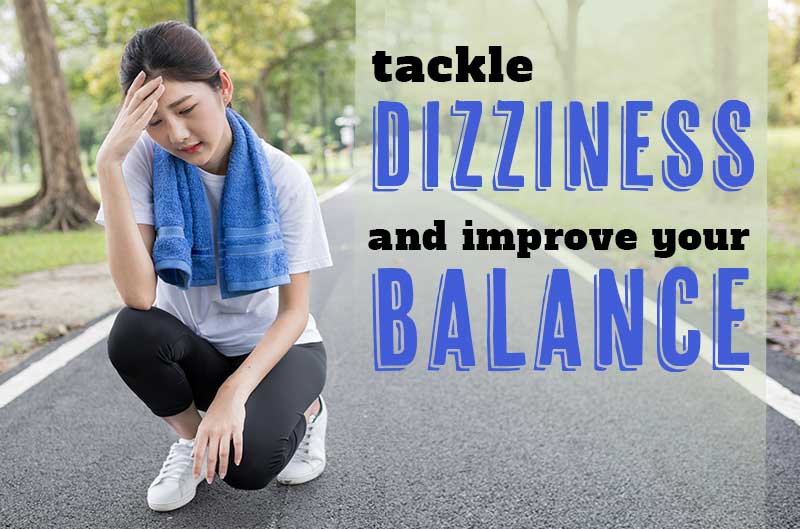Need a Little Balance in Your Life? Try Physical Therapy
Exercise and NutritionPosted:

Learn how to tackle problems with dizziness and prevent falls
Your favorite amusement park ride always leaves your head spinning and maybe your stomach in knots. That’s the fun of it – that feeling you’re moving this way and the world’s moving that way.
But the sensation of moving, spinning, or floating when you’re moving about your home, getting out of your car, reaching for something on a shelf is unwelcomed and can be downright frightening.
You may have a “vestibular” problem. As many as 35 percent of adults aged 40 years or older in the United States—about 69 million Americans—have experienced some form of vestibular dysfunction.
Chronic dizziness and declining balance skills can affect many of our daily activities, especially ones that require that we keep our eyes focused and our bodies stabilized as we shift our weight, bend, or move our head. Frequent dizzy spells or constant dizziness, while not life-threatening, can really make life miserable and increase our risk of falls.
Cynthia Ryan, executive director of the Vestibular Disorders Association, says anyone, regardless of age, can suffer a devastating fall because of vestibular dysfunction.
“The vestibular system lives in the inner ear and tells the brain where we are relative to our surroundings,” Cynthia says. “If the vestibular system is damaged due to illness or injury, a person might experience dizziness, imbalance, disorientation, or even spinning vertigo. This can happen to anyone, at any age.”
What causes a vestibular disorder?
Nathalie Grondin, a licensed physical therapist who specializes in vestibular rehabilitation, says a variety of health conditions, such as inner ear infections and head injuries, can cause vestibular symptoms.
“Vestibular rehabilitation helps reprogram the brain, improves coordination between the head and the eyes, improves balance, and increases confidence,” Nathalie says. “Eye and head coordination exercises, like focusing on a target and turning the head side-to-side, are the bedrock of our vestibular rehabilitation approach. These targeted exercises are designed to alleviate symptoms like vertigo, dizziness, and/or unsteadiness.”
Most people acknowledge a balance problem only after they'v fallen and perhaps suffered a serious injury. Fortunately, Hope, one of Nathalie’s clients, took action sooner than later. Hope saw her ENT (ear, nose, and throat) doctor after experiencing bouts of vertigo that made her feel dizzy and nauseous. “I was diagnosed with an inner ear issue,” she recalls. “My doctor suggested physical therapy to help improve my balance and decrease my symptoms.”
Nathalie and Hope worked together twice a week. In a month, Hope was discharged from physical therapy. “I had a great experience,” she says. “Nathalie was an exceptional teacher and physical therapist. I feel so much better knowing that this condition can be fixed. I know what to do now if any symptoms return.”
Nathalie says if you’re having balance issues that concern you, see your doctor to get a referral for a balance evaluation.
Living with a Vestibular Disorder? Help Prevent Falls at Home
- About half of all falls happen inside the home. Take these steps to fix the dangerous areas in your home.
- Place railings on both sides of all stairs inside and outside of your home.
- Have grab bars inside and outside your bathtub or shower and next to the toilet.
- Use non-slip mats in the bathtub or shower.
- Remove small rugs or use double-sided tape to keep rugs from slipping.
- Use bright lights throughout your home, especially on the stairs.
- Keep stairs and places where you walk clear of clutter. Pick up or move things you can trip over, like cords, papers, shoes, or books.
- Keep kitchen items you use often in easy-to-reach cabinets or shelves.
Looking for More Information?
Lee Health also offers free balance screenings throughout the year to evaluate your risk of falling and if you require further evaluation and possible intervention. Don’t have a primary care doctor? You can find one here.
To learn more about Lee Health outpatient rehabilitation balance and vestibular services and events, email rehabservices@leehealth.org.
If you would to contribute to Healthy News, please contact us at Social@LeeHealth.org

